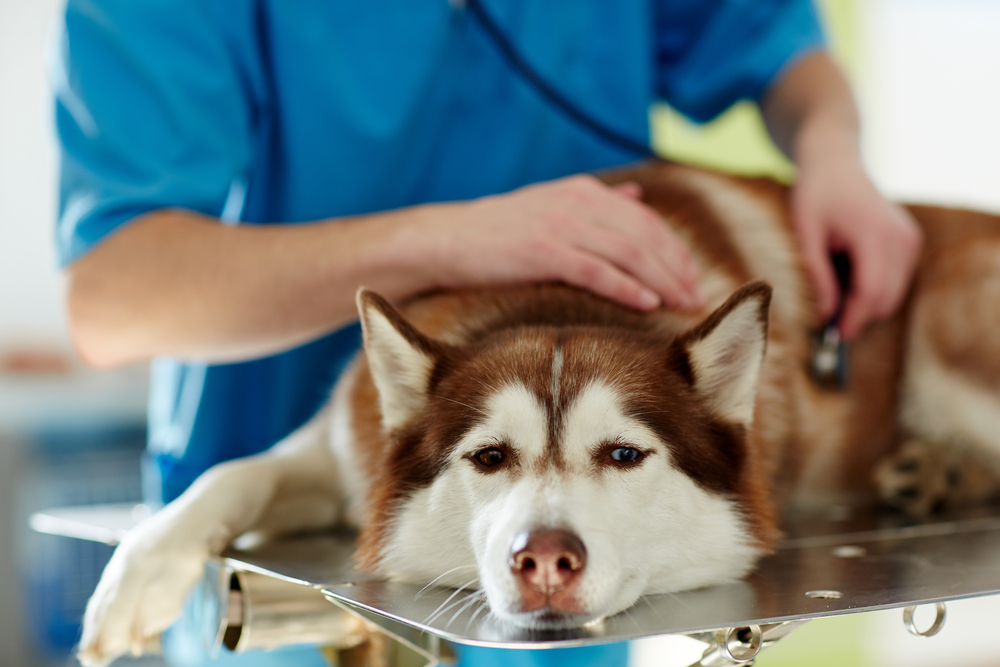In this article
View 4 More +Pet parents understandably may have many questions about various diseases that may be present in their dogs. One question that was asked of me as a veterinarian is, “Can pancreatitis cause seizures in a dog?” While the majority of pancreatitis cases do not cause seizures in our canine companions, a small subset of pancreatitis cases could cause seizures to happen.
In this article, we’ll explore more about this concept, including what pancreatitis is, more typical signs observed in dogs, and what can cause seizures in dogs. Because both pancreatitis and seizures are serious health conditions, it’s important to learn more about them both in our canine companions.

About Pancreatitis
The pancreas is a glandular organ that is located in a dog’s internal abdomen. It is cradled between the lower part of the stomach and the start of the small intestine and has two primary functions. One is to secrete digestive enzymes that aid in the digestion of foodstuffs. The second function is to produce insulin and to help the body regulate blood sugar levels.
Pancreatitis occurs when the pancreatic enzymes that are normally released from the pancreas begin to digest the pancreas itself. This autodigestion results in inflammation and can not only cause problems within the pancreas but also to surrounding organs such as the liver.1 In less common but very severe cases, pancreatitis may also affect a dog throughout their body. Overall, pancreatitis has the potential to be life-threatening and is usually thought to be painful.
While the illness exists on a spectrum from mild to very severe, it may come on quickly (called acute) or occur over a long period of time (termed chronic).
While in most cases the primary cause of pancreatitis is idiopathic (unknown), risk factors of pancreatitis include eating high-fat food(s), being overweight, a pancreatic tumor, some endocrine diseases (for example, hypothyroidism), trauma to the pancreas, or even certain kinds of medications. Some breeds, such as Miniature Schnauzers, are also more likely to develop pancreatitis.

Signs
Overall, signs can be vague and may vary based on the severity of the illness. Most commonly in dogs, the signs that are seen include not wanting to eat, lethargy, vomiting, and a painful abdomen.
Sometimes diarrhea or a fever may be present. In more severe forms of the illness, an inflammatory response across the body can occur. This could include additional complications such as shock, renal failure, disseminated intravascular coagulation (“DIC”, a serious health condition where there is abnormal blood clotting and bleeding), or neurologic signs.
Those with neurologic signs have severe cases of pancreatitis and are referred to as having pancreatic encephalopathy; examples may include mental disorientation or seizures.

Diagnosis
Diagnosis may include history, physical exam findings, and lab work. Bloodwork and some tests such as a canine pancreas-specific lipase (SNAP cPL) may help aid in diagnosis. Radiographs may show some classic signs or rule out other causes, but ultrasound is typically preferred for diagnosis.
Treatment
Historically, treatment has consisted of symptomatic and supportive care such as pain relief, antiemetics (anti-vomiting/nausea medication), fluid administration, and nutritional management as key components. Recently, in the United States, a new injectable drug called Panoquell-CA1 is being marketed to help manage signs of acute pancreatitis in dogs.2

Common Causes for Seizures
Seizures can simply be defined as uncontrolled electrical activity bursts in the brain. Seizures can have a wide variety of potential causes. Some common classifications of causes include idiopathic (unknown causes), extracranial causes (due to outside the brain), or intracranial (due to inside the brain).
1. Idiopathic (the most common cause of seizures in a dog).
Idiopathic refers to a condition where the root cause cannot be determined. In most instances of seizures, the cause remains unidentified.
2. Extracranial causes (seizures caused by factors outside of the brain).
These can include:
- Metabolic encephalopathies which are problems in the brain due to a chemical imbalance from systemic disease. Examples may include hypoglycemia (low blood sugar) or pancreatitis.
- Poisoning due to various substances such as ethylene glycol, lead, or mycotoxins.

3. Intracranial causes (seizures caused by factors inside of the brain).
Examples include:
- Primary epilepsy—diagnosis of recurring seizures
- Brain trauma
- Inflammation of the brain
- Brain tumors
- Congenital diseases within the brain
- Inflammatory diseases within the brain caused by viruses, bacteria, etc.
Depending on the cause and severity, seizures may need further testing and/or treatment. What is important to know in this article, is that while pancreatitis could bring about seizures, it is not a very common cause of them.

Conclusion
While the average pancreatitis case in a dog does not typically cause seizures, seizures could be possible in a small number of dogs with a severe form of the illness.
With that being said, there are numerous other causes and presentations for both of these medical conditions and being aware of signs to look out for and when to seek medical advice is pivotal in keeping your dog healthy and safe.
Featured Image Credit: Jaromir Chalabala, Shutterstock






















